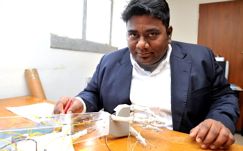SA-developed 'smart glove' for leprosy patients
22 November 2013
Innovative technology to help leprosy patients that was developed partly at the
University of Cape Town is currently being tested in India.
The "tactile" or smart glove tracks pressure points on the palms and fingers and helps
prevent injuries to hands and digits as a result of nerve damage and sensory loss. It
is being tested at the Leprosy Mission Hospital in New Delhi, India.
About 95% of people are naturally immune to leprosy, caused by mycobacterium
leprae, which results in progressive damage to skin, nerves, limbs and eyes.
Leprosy does not cause body parts to fall off, although they can become numb or
diseased as a result of secondary infections as the disease compromises the body's
immune system.
Though curable thanks to multi-drug interventions, those who develop the disease are
prone to nerve damage. Patients often suffer a "secondary tier" of injury and disability
because they cannot feel heat
or pressure from objects they come into contact with.
Simple solutions
There are around 232 000 new cases of leprosy each year. Of these, India has
the highest concentration at about 56% of the global burden, followed by Brazil. There
are dedicated leprosy hospitals in India.
In South Africa, the figures are low, about 50 to 70 new cases a year, predominantly
in the Eastern Cape and from neighbouring countries such as Swaziland and
Mozambique.
Dr Sudesh Sivarasu, a lecturer in biomedical engineering in the Department of Human
Biology at the University of Cape Town (UCT), believes in developing simple
biomedical solutions to problems like these.
Sivarasu took an off-the-shelf fabric glove to model his own - a stretchable glove that
uses a revolutionary fabric with built-in nanosensors.
"We've created an artificial sense of touch," he said. "The fabric picks up haptic
factors like roughness, temperature, pressure, and
humidity."
The glove also maps how a person uses their hand to establish where the pressure
variations are during simple domestic activities, such as cutting wood or cooking.
These are recorded to show where ulcers are likely to develop.
This allows patients, who often live far from hospitals, to practise preventative care,
especially to the fingers.
"Because of wound infection, the digits are the first to go in leprosy patients and
amputation usually follows," said Sivarasu. "We want to make this glove widely
available."
His invention has been covered by BBC-Health Check, which was telecast on BBC
World.
'Out of the box'
Born and educated in India, Sivarasu said he has experienced the despair of seeing a
loved one die because of the prohibitive cost of medical intervention in India.
In South Africa, where 90 to 95% of medical equipment is imported with up to 300%
mark-up, the excessively high cost is passed on
to the patient. "This in a country with
world-class engineers and clinicians," said Sivarasu, whose watchwords are
"affordable" and "simple".
This has motivated him to develop indigenous technology.
Sivarasu and his team of postgraduate students have come up with a number of other
innovative, inexpensive solutions to common medical problems, such as locally
designed drip lines for re-feeding, which are little more than a coil of thin plastic
tubing with a plastic drip chamber attached.
South Africa uses "thousands and thousands of these" every day, but they are
currently imported from Germany.
"We're thinking out of the box," Sivarasu said. "Too often we get stuck in a cycle of
novelty and academic outcomes. We want to be able to make things easier, make it
cost-effective - and get it to the masses."
For his PhD, Sivarasu developed a high-flexion artificial knee implant for Eastern
cultures, where people squat or sit on low
platforms. Western prostheses do not
provide the 120-degree flexion extension, the range needed for comfort when semi-
squatting.
Edited version of a story first published in UCT's Monday
Monthly. Published here with kind permission.
 Dr Sudesh Sivarasu: showcasing prosthetic devices developed at UCT-Biomedical Engineering (Image: Raymond Botha, UCT)
Dr Sudesh Sivarasu: showcasing prosthetic devices developed at UCT-Biomedical Engineering (Image: Raymond Botha, UCT)


